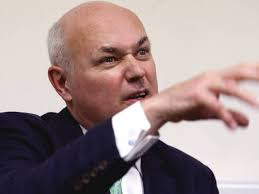Britain had a real mess of a system for providing benefits – what other people call social security – to people who need them. To mention just the main ones, there was housing benefit and invalidity benefit and unemployment benefit and, just to confuse everything, even tax credits in employment, to boost the earnings of the low paid.
Who had a right to which? For how long? And under what conditions?
So it made sense to put an end to this chaotic mess. Replace this whole raft of multiple criss-crossing benefits and replace them with just one, tailored to the individual. Why, we could call it universal credit and have it replace all the rest.
 |
| Iain Duncan Smith A remarkable track record. To which he keeps adding |
You don’t remember Cameron? Don’t worry. He was immensely forgettable. He enjoyed a brief and ill-deserved moment in the limelight as British Prime Minister before returning to the far more merited obscurity from which it’s unfortunate he ever emerged.
In the meantime, Duncan Smith got his chance to introduce universal credit.
A brilliant idea, as I said before.
Except that a brilliant idea in the hands of a Tory Minister, in a government wedded to austerity, is unlikely to look as generous on closer scrutiny as it sounds on the surface. So it turned out with this one. As this enlightened minister made clear in an article for the favourite paper of the Tory party, the Daily Telegraph (or Torygraph as those of us of another persuasion like to call it):
By restoring the incentive to work and ensuring that work always pays, universal credit is the strongest statement of this Government’s commitment to helping people get the security of a good job.
See the sleight of hand? “Incentive to work” is Tory doublespeak for “we’re going to make this so mean that no one could possibly live on it so they’ll be forced to take a job, however dismal”. A “good job” in this context is Toryspeak for “a reduction of one in the unemployment figures”.
Just to avoid any possible doubt, Duncan Smith also explained that “our reforms are forecast to save a total of nearly £50 billion cumulatively across this Parliament.”
Saving money. Always a welcome message for the recipients of state benefits, who know it means a major effort of generosity on the part of government.
Duncan Smith brought to the task of designing universal credit all the flair he’d shown in leading his party.
It’s taken five years to build the system. It’s being trialled right now in several local council areas. The results have been eloquent: there’s been a huge increase in dependence on food charities and in rent arrears. One food bank, according to Patrick Butler in the Guardian has reported a 97% increase in demand.
Meanwhile with that pesky housing benefit out of the way, councils are reporting huge increases in rent arrears. One council, the Guardian again tells us, reports dramatic figures:
Southwark said that although just 12% of its social housing tenants were on universal credit, they have built up £5.8million in rent arrears. The average universal credit household £1,178 in arrears, compared with £8 credit for the average council rent across the borough.
That’s why they call it universal: it spreads joy everywhere. Not just the tenants who can enjoy piling up rent arrears, and celebrate the fact down at their local food bank, but the council who sees its rent income falling.
As Duncan Smith so eloquently put it, he was building “a system that supports people to secure independence for themselves and their families.”
The wonderful thing is that, although he was sacked by Theresa May, our soon-to-be-former Prime Minister who replaced David Cameron (remember him now?) he keeps popping up and speaking out on the subjects he cares about. Most notably, he’s terribly keen on Britain getting out of the European Union. Just the other day, I heard him on the BBC explaining why Britain had nothing to fear from Brexit and everything to hope for.
It’s extraordinary, with his track record, that there are still people out there prepared to listen to him.
And, still more difficult to understand, believe him.
No comments:
Post a Comment